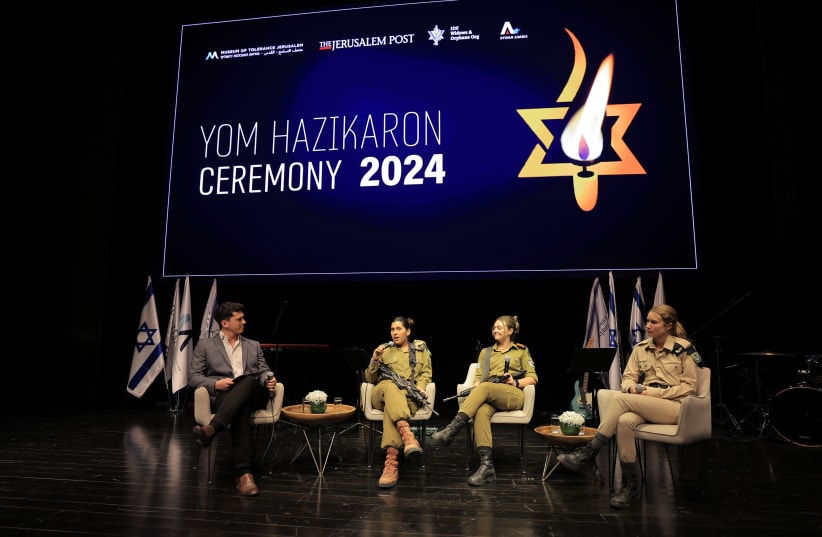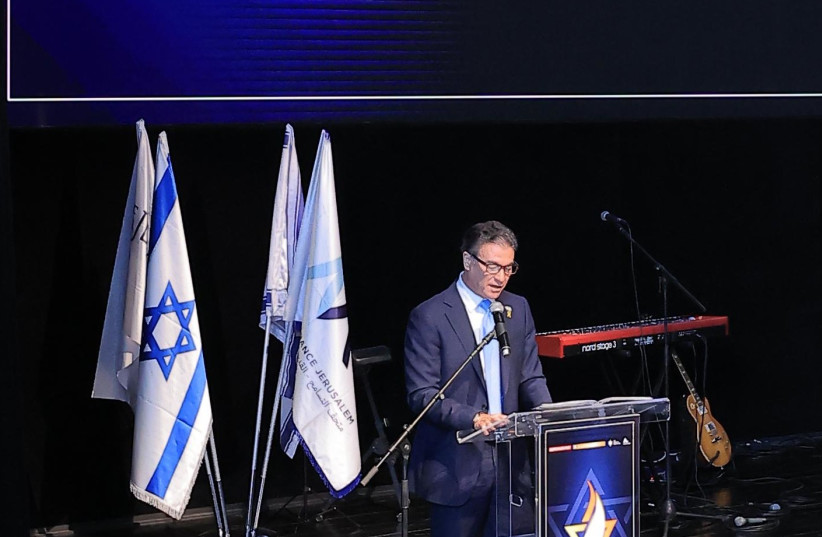The Jerusalem Post, the Museum of Tolerance Jerusalem, the IDF Widows and Orphans Organization, and the the Sylvan Adams Foundation held a special ceremony to commemorate Remembrance Day.
The ceremony, which was held for the second time at the new Museum of Tolerance in Jerusalem, opened at 8 p.m. with the sounding of the siren for the moment of silence in memory of the fallen.
The military rabbinate band sang throughout the ceremony.
The ceremony was broadcast on The Jerusalem Post.
An empty chair was left on stage in memory of those who are still held hostage in Gaza.
At the opening of the ceremony, Anat Meir came on stage to light the torch of remembrance.
Remembering and honoring heroism
Meir is the widow of the late Major David Haim Meir, a combat soldier in Sayeret Matkal who fell on October 7 in the heroic battles in Kibbutz Be'eri.
David, 31, was at the vanguard of the forces that entered the kibbutz. They managed to save many while under fire from Hamas, before being killed.
Anat was joined in the lighting of the beacon by Chief Superintendent Efrat Oren, a close friend and her commander in the Israel Police, who also lost her nephew in the war, St.-Sgt. Amit Most, a medic in the Nahal's Brigade’s ‘Orev’ reconnaissance unit. He was killed in the Battle of Sufa Base on October 7.
After Liav Shlomo was called to recite the Kaddish for his late father, Sr.-St.-Sgt.-Maj. Adir Shlomo, head of logistics at the Sderot Police. He fell in the fierce fighting at the police station on October 7.
Adir, 47 years old, was killed with six of his friends and comrades, the police officers of Sderot.
Rabbi Marvin Hier, founder, CEO and president of the Simon Wiesenthal Center (SWC) and the Museum of Tolerance that the center established, recited the moving prayer "El maleh Rachmim [God full of Mercy]" in the hall.
"Memorial Day this year is a different day of remembrance,” Hier later commented. “We are in the midst of a war both against our enemies and against the growing antisemitism in the world. An international memorial ceremony is intended to present to the world and the general public the severe loss we are experiencing as a nation."
The former head of the Mossad, Yossi Cohen, current President of the International Friends Association of the IDF Widows and Orphans organization, also participated in the event.
"Without military pressure, the diplomatic efforts will not work," he said.
Cohen came out strongly against the international bodies that seek to tie Israel's hands and said: "Hamas is a cruel enemy that does not care about human life. Israel must be given a free hand to act against it. Tying Israel's hands against Hamas in Gaza will only tighten the rope around the hands of the captives."
“132 empty chairs, 132 holes in our hearts, 132 reasons we cannot rest until they are home,” he further said, referring to the hostages.
"Israel thanks our allies and partners who helped us against the Iranian attack, but the time has come to say: Enough is enough,” he added. “We need a strong international offensive coalition against Iran and it must be proactive and bring an end to Iran's destructive ambitions."
Then there was an emotional moment after Iris Haim came on stage. Haim’s son Yotam, who was kidnapped from his home in Kfar Aza, survived being held captive for 65 days, managing to escape from his captors but was killed after being accidentally shot by an IDF soldier.
“What Yotam did, gave so much meaning to what happened. He was part of a battle that is ours, my grief is not private but ours. And this makes it easier,” Haim said. “I don’t blame anyone for his death, death is natural. I do not blame anyone, he went out in a heroic way in his own way, looking for freedom.”
Also, Yasmin Margolis, the widow of Saar Margolis, spoke, sharing the story of her husband's heroism. Saar, a member of Kibbutz Kissufim, fell in the battles against terrorists on October 7 while serving in the kibbutz's emergency standby squad.
“When he went to rescue the security coordinator in the kibbutz, he was shot and killed after freeing many homes from terrorists. My daughters will grow up knowing that their father was a hero who saved many lives.”
The event also included a panel with female lone soldiers who chose to serve in the IDF despite the great distance from their family.
"On the eve of Memorial Day, during this profoundly painful year—the deadliest for our country in five decades—I feel immense respect for the resilience of thousands of widows and orphans,” said Shlomi Nahumson, CEO, IDF Widows & Orphans Organization. “Their choice to promote growth and continuity amidst immense tragedy powerfully underscores our duty to honor the fallen by building a better society."
"This year's Memorial Day especially connects the memory of the fallen throughout all generations and the history of the State of Israel, to our difficult and painful present at this time,” commented Jonathan (Yoni) Riss, MOJT's director of operations. “The entire people of Israel, in the land and in the diaspora, understand very well the cost of existence of the Jewish people and their state hour by hour and even more so in light of the war with Hamas. The mutual bond that grew out of the pain is our hope for a better future."

